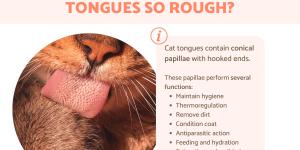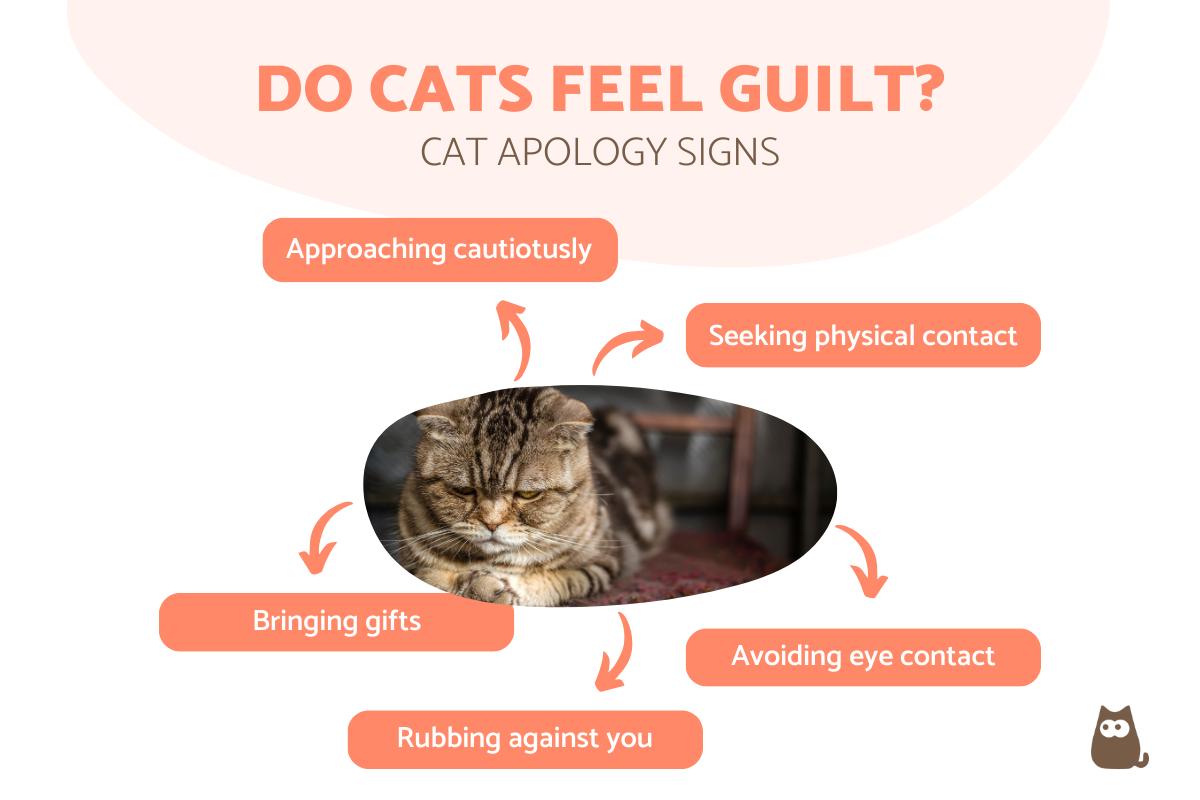Do Cats Feel Guilt? - Cat Apology Signs

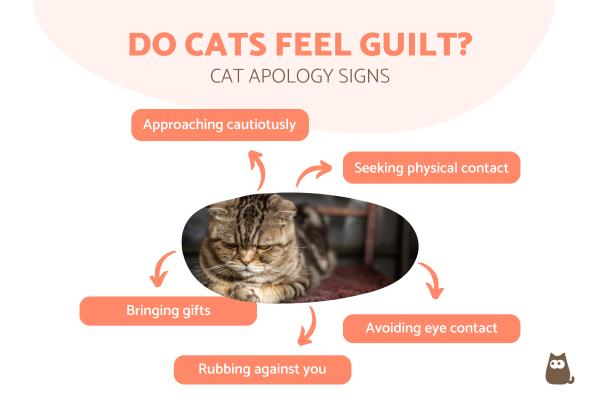

See files for Cats
Cats cannot feel guilt the way humans can. Since they are such curious animals, it is very common for cats to get up to mischief. They can knock ornaments over, urinate somewhere they shouldn't or scratch anything within reach. These are normal behaviors for cats since they consider their environment and the objects within it to be their own. Although they can build affectionate and even reciprocal relationships with humans, they are not as emotionally complicated as those we have with other people. This doesn't mean they cannot sense a problem. What we might assume to be a cat apology sign is usually a cat showing their desire for security in a given moment.
AnimalWised explains more by asking do cats feel guilt? We understand what is really going on when it seems a cat is apologizing. We also look at the ways in which cats seem to say sorry.
Can cats feel guilt?
As with other animals, cats do not experience guilt in the same way humans do. Guilt is a complex emotion linked to self-awareness, morality and understanding of right and wrong. While cats are intelligent and have a range of emotions, their behavior is primarily driven by instinct, learned associations and immediate circumstances.
If a cat appears to display behaviors that we might interpret as guilt, it's usually a response to the reaction of their human guardian. For example, if a cat knocks over a vase and their owner scolds them, the cat might display submissive body language or avoid eye contact. This behavior is more likely a reaction to the guardian's tone and body language, rather than the cat feeling guilt in the way humans do.
Humans apologize due to social constructs and as a response to complex emotions. These constructs change according to many factors within different societies and even individual relationships. Cats have their own societies of which we are a part, but they do not have the same constructs.
A common example in the home is to do with property. If we damage someone else's property it is seen as wrong and we will often say sorry for doing so. Cats can associate objects with specific people, but they do not understand this concept of property. The objects in their environment belong to them, so they will see no need to apologize if they damage them.
We can see a cat's sense of ownership with their marking behavior. Not only will cats mark objects such as couches and beds, but they will mark their human family. This is part of a system of communication which is not the same as our own. Cats don't experience guilt as a complex human emotion, so they won't feel the need to apologize.
What is a cat apology?
Despite the fact cats cannot feel guilt the way we do, they do show behaviors which can appear like an apology. These are responses to the learned associations they make as a companion animal in the home. Over time, the cat will learn boundaries about what behaviors are acceptable or unacceptable. They will also make associations with the behaviors of their humans to understand what they are trying to communicate.
While it will only be to a certain extent, cats accept these boundaries as a trade off for security. Their human guardians provide security and protection. We give them food, provide places of comfort and even give them affection which improves the cat's well-being. When we see positive behaviors from cats, we can recognize them as signs a cat loves and trusts us.
If a cat does something that threatens this sense of security, they will also make learned associations. When we are annoyed at something the cat does, they will understand it. This annoyance will be perceived as a possible revocation of the security we provide. In these cases, they will want to show us they still want to maintain the harmony of the household. The behaviors they carry out to do so are what we often interpret as a cat apologizing.
These behaviors they use to mollify humans are the same as those used with other cats. They are known as calming signals and they are very important for solving resolutions in the wild. Cats us calming signals to prevent fights, show dominance or compete with for a mate. Some of the behaviors we think of as being a cat saying sorry are really calming signals to avoid a fight.
Although we know the cat does not feel guilty, we will look at some of these cat apology behaviors below.
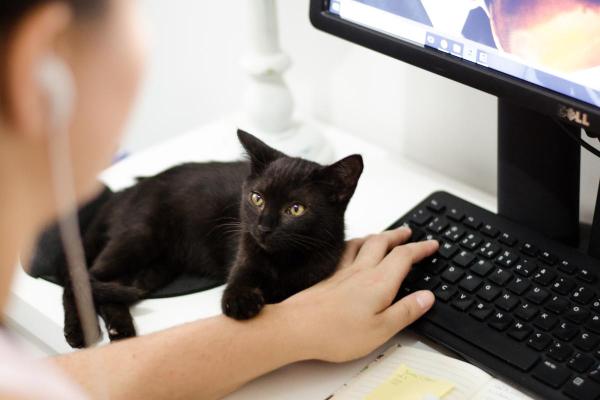
Approaching you cautiously
One of the most common ways a cat appears to say sorry is by adopting a posture of submission. It is a sincere and endearing behavior which the cat knows can help us to feel calm. By approaching you gently with their head lowered, ears folded back and tail between their legs, they are showing submission to you. It is one of the most obvious calming signals which cats use to communicate with other felines and shows a desire for reconciliation.
Learn more about calming signals in cats with our guide to cat body language.
Seek physical contact
Another way cats apologize is by actively seeking physical interaction. In this case, they will lie down or sit next to you. In doing so, they are ‘giving you permission’ to pet them. They may roll around so the cat exposes their belly to you. This is a profound signal of trust since this is their most vulnerable area of the body. They want to show that they are close to you so you can maintain the positive relationship they have come to enjoy.
Avoiding eye contact
Within the feline communication, fixed and sustained gazes are a call to fight. A cat will stare with another if they want to show they are willing to fight, with some cases being enough to stare them down. In this case, the other cat will avert their eyes to show they are submissive and not wanting to fight. For this reason, a cat will avoid eye contact with their guardian while still remaining in close proximity. This shows they are wanting to maintain their bond.
Learn more about this kind of behavior with our article on the weird things cats do.
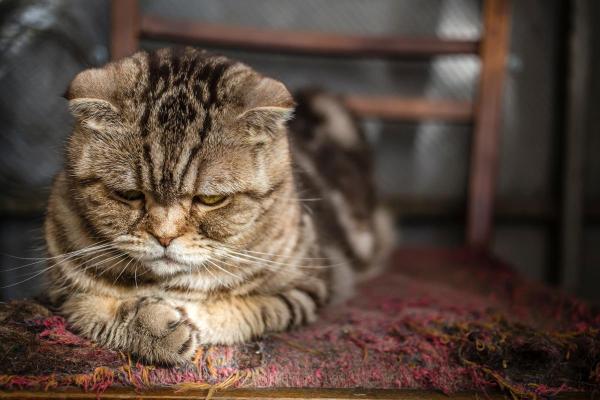
They bring you gifts
Cats may bring their owners ‘gifts’ in the form of prey (like dead rodents or insects). This behavior could be seen as an attempt to share or contribute to the household, although the cat isn't necessarily apologizing. Between equals it is indicative of appreciation, mutual care and familiarity. Bringing you gifts shows a desire to ensure our well-being, something they will only do if they care for us. Indoor cats may do the same with toys and other beloved objects.
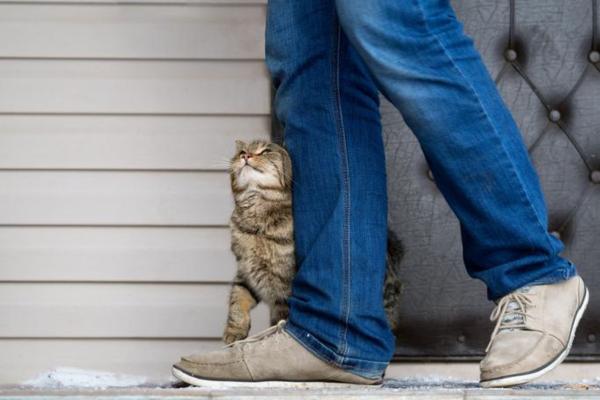
Rubbing against you
What appears to be a cat apology can manifest through physical contact, often in the form of rubbing. If you rise from your seat or stand up, your cat seizes the chance to approach you and rub their flanks against your legs. This behavior isn't indicative of guilt, but serves as a way to reaffirm the group scent bond. By transferring their pheromones onto you, your cat is re-establishing a connection with your shared scent. Your willingness to engage in this physical contact confirms your acceptance and reinforces your partnership.
Squinting and purring
Those in the AnimalWised community will know that scolding and yelling at cats is both harmful and counterproductive. Not only will the cat not understand why you are angry, their trust in you will be diminished. For this reason, you should always reinforce the behaviors you want to encourage and redirect those you want to avoid. When they notice you are angry, it is most likely they will squint their eyes and purr as a way to show submission. They may even lick you gently to seek affection.
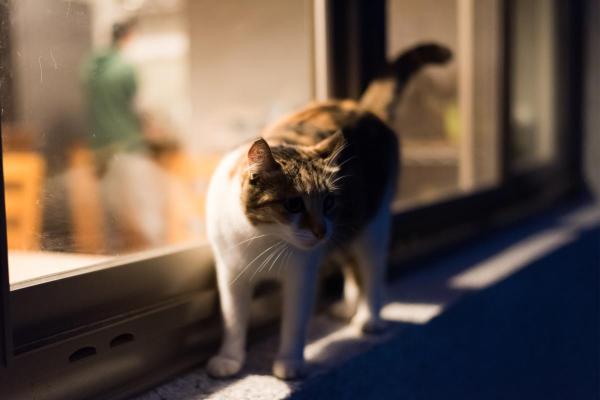
Meowing softly with tail raised
Another way to know if your cat is saying sorry is through meowing. In this case, they will establish a timid eye contact and approach very gingerly. If they see signs of approval in your expression and body language, they will meow softly for encouragement. They will keep their tail upright, but relaxed as they do so. This behavior is very common among Asian breeds of cat such as the Siamese which are known for expressing themselves vocally.
If you want to read similar articles to Do Cats Feel Guilt? - Cat Apology Signs, we recommend you visit our Facts about the animal kingdom category.
- Álvarez Bueno, A. (2021). Feline Ethology: A Basic Guide to Cat Behavior . Amazing Books Publisher.
- Gray, J. (2021). Feline philosophy: Cats and the meaning of life . Editorial Sexto Piso, SA de CV.
- Hattori, Y. I If Your Cat Could Talk...: How to Maintain a Healthy, Long-Lasting Relationship with Your Feline Friend . RBA Books Publishing House.


